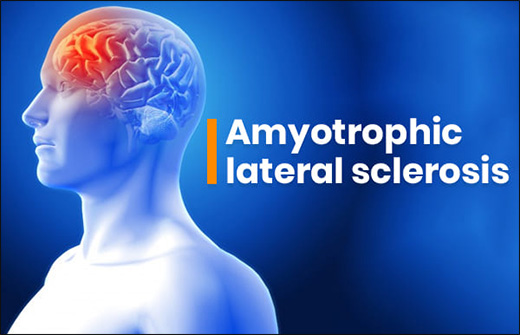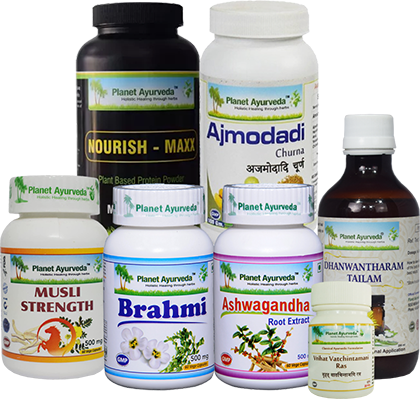Amyotrophic Lateral Sclerosis And Its Ayurvedic Management
Abstract
There are a number of disorders of the neurological system that cause a number of symptoms including numbness, loss of muscle function, loss of sensation, involuntary contractions etc. One of such conditions is Amyotrophic Lateral Sclerosis. Amyotrophic Lateral Sclerosis is a progressive disease of the nervous system which is characterized by loss of muscle control. ALS is frequently called Lou Gehrig’s disease after the condition was diagnosed in a baseball player. In the following section we shall have a little discussion about the condition of Amyotrophic Lateral Sclerosis and its management in the contemporary system of medicine as well as the Ayurvedic system of medicine. Let’s discuss!!

Introduction
Amyotrophic Lateral Sclerosis (ALS) is also called motor neuron disease. It is a neurodegenerative condition that results in progressive loss of motor neurons that control the voluntary muscles. The condition of the patient deteriorates as the disease progresses. The exact cause of the condition is unknown. Though it is thought that the condition might have genetic and familial factors. There are also thoughts about the condition being related to the environmental toxins. The condition has no cure available though the modern system of medicine aims on the betterment of the quality of life and increasing the survival of the patient. In Ayurveda, the condition is correlated with vata dosha vitiation as vata dosha governs all the musculoskeletal and neurological functions. As the neurological system and musculoskeletal system is involved in Amyotrophic Lateral Sclerosis. Therefore, the condition is compared with Vata vyadhi.
Causes Of Amyotrophic Lateral Sclerosis
- The exact cause of ALS is unknown.
- Genetic and environmental factors are considered behind this condition.
Usual Onset Of Amyotrophic Lateral Sclerosis
- Age of 58 to 63 for sporadic ALS
- Age of 47 to 52 for familial ALS
Following Risk factors has been established
- Age: The risk increases with age and most commonly affects people of age between 40 and mid 60s.
- Sex: Usually occur more in men than women before the age of 65 but after that sex difference vanishes.
Environmental Factors
- Smoking is one of the greatest risks involved. It usually seems to be of greatest risk for women.
- Exposure to lead or other things that are toxins can be linked to ALS.
- Studies have shown or indicate that those who have served in the military are at a greater risk of developing ALS.
Symptoms Of Amyotrophic Lateral Sclerosis
Early: Muscle stiffness, muscle twitching, gradual increasing weakness.
Later: Difficult speaking and swallowing and breathing. Respiratory failure.
- Difficulty in walking and doing normal tasks
- Falling
- Weakness in the legs, ankles and feet
- Slurred speech
- Weakness in the hands
- Cognitive and behavioural changes
- Muscle cramps and twitching of the muscles
- Difficulty in swallowing
Diagnosis
- Medical history
- Neurological symptoms
- MRI brain
Complications
- Breathing problem is one of the main complications
- Speaking problems
- Eating difficulty
- Dementia
Management
- There is no cure available for ALS
- The focus of the management is treating symptoms and providing supportive care with the aim of improving life quality and prolonging lifespan.
- Riluzole prolongs lifespan by 2 to 3 months.
- NIV, which is Non-invasive ventilation, is the management of respiratory failure in Amyotrophic Lateral Sclerosis. It is helpful in improving quality of life and prolongs life span for about 7 to 8 months.
- Invasive ventilation is indicated in the patients with advanced ALS. It reduces life quality but increases lifespan.
- Palliative care.
- For depression, selective serotonin reuptake inhibitors (SSRIs) and tricyclic antidepressants are used. Benzodiazepines are used for anxiety.
- There is no medication available for frontotemporal dementia.
- Tizanidine and baclofen are used to relieve spamstic conditions.
- Amitriptyline, atropine and scopolamine is used in patients who are unable to swallow their saliva.
- Physical therapy
Ayurvedic Management
- The condition is caused by the vata dosha vitiarion therefore the management depends on the pacification of the vata dosha. There are a number of herbs available that are used in vata vitiation. Single herbs include erand, nirgundi, rasna, patla, gambhari etc.
- And the formulations available which pacifies vata dosha are vata vidhwansan ras, vrihat vatchintamani ras, yograj guggul, rasraj ras, trayodashang guggul etc.
Herbal Remedies for Amyotrophic Lateral Sclerosis by Planet Ayurveda
Planet Ayurveda is an eminent GMP certified, ISO 9001:2015 certified and US-FDA registered Ayurvedic Company, which adhered to the objective of manufacturing quality Ayurvedic products as described in the various ancient texts of Ayurveda. formulations are manufactured without additives and preservatives and other kinds of chemicals or artificial flavouring agents which have a number of side effects on the human body. Products prepared at Planet Ayurveda are pure and do not contain any kind of adulteration. The products are purely organic and vegetarian and gluten free. Planet Ayurveda has come up with some formulations that are helpful in pacifying the vata dosha and managing the condition of Amyotrophic Lateral Sclerosis.
Following is the list of formulations that helps in managing the condition
- AJMODADI CHURNA
- ASHWAGANDHA CAPSULES
- BRAHMI CAPSULES
- MUSLI STRENGTH CAPSULES
- RIHAT VATCHINTAMANI RAS
- NOURISH-MAXX
- DHANWANTHARAM TAILAM
Products Description
1. AJMODADI CHURNA
Ajmodadi Churna is a classical ayurvedic formulation which is used in a number of conditions. The churna is comprised of ajmoda (Apium graveolens), haridra (Curcuma longa), amla (Emblica officinale), yavakshar (Hordeum vulgare) and chitrakmool (Plumbago zeylanica). The churna relieves the spasms that occur in Amyotrophic Lateral Sclerosis. It helps in promoting muscle function by stimulating the inactive muscles in the condition of ALS. It therefore helps in ALS.
Dosage: One teaspoon twice a day with normal water.
2. ASHWAGANDHA CAPSULES
Ashwagandha capsules are filled with the goodness of the herb ashwagandha (Withania somnifera) that possesses rasayana properties. The capsules pacify the vata dosha. And helps in maintaining the good health of the neurological system. As it pacifies the vata dosha it reduces the stiffness and spasm of the affected muscles in the condition of Amyotrophic Lateral Sclerosis. Therefore, it helps in stimulating the muscle. It further improves the proper nerve conduction to the muscle. Therefore, Ashwagandha Capsules are useful in Amyotrophic Lateral Sclerosis.
Dosage: One capsule twice a day after meals with plain water.
3. BRAHMI CAPSULES
Brahmi Capsules are composed of the extract of herb brahmi (Bacopa monnieri). Brahmi is a beneficial herb in providing wellness of the neurological system. It is a herb that pacifies the vata dosha. As the condition of Amyotrophic Lateral Sclerosis is due to vata dosha vitiation therefore brahmi capsules are beneficial in it.
Dosage: One capsule twice a day after meals with plain water.
4. MUSLI STRENGTH CAPSULES
Musli Strength Capsules are enriched with goodness of gokshura (Tribulus terrestris) and safed musli (Chlorophytum borivilianum). Both the herbs pacify vata dosha. It strengthens the muscles and improves nerve conduction. Therefore in the condition of Amyotrophic Lateral Sclerosis, Musli Strength Capsules are of use, as they provide strength to the neurological system and musculoskeletal system.
Dosage: One capsule twice a day after meals with plain water.
5. VRIHAT VATCHINTAMANI RAS
Vrihat Vatchintamani Ras is a classical Ayurvedic mineral formulation. The formulation is made up of Rajata Bhasma (silver calx), Swarna Bhasma (gold calx), Loha Bhasma (iron ash), Abhrak Bhasma (mica ash), Suta Bhasma (compound of purified mercury and purified sulphur), Mukta Bhasma (pearl calx) and Pravala Bhasma (coral calcium). It also has juice extract of Aloe vera. It is beneficial in demyelination conditions of nerves. It is useful in neuropathies. It alleviates the neurological pain. Further facilitates the nerve sensation to the muscles and provides power to the muscles. As it is a drug of choice is vata vyadhi, hence is useful in the vata vitiated condition of Amyotrophic Lateral Sclerosis.
Dosage: One tablet twice a day after meals with plain water.
6. NOURISH-MAXX
Nourish-Maxx is a product of Planet Ayurveda which provides nutrition and energy to the body. Which ultimately benefits the musculoskeletal system. The formulation contained the essential elements of the herb shatavari (Asparagus racemosus), safee musli (Chlorophytum borivilianum), ashwagandha (Withania somnifera), gokshura (Tribulus terrestris). All these herbs are known to provide energy to the muscles. Therefore, Nourish-Maxx is useful in the condition of Amyotrophic Lateral Sclerosis as it helps in movements and contractions of the muscles.
Dosage: One teaspoon twice a day with normal water.
7. DHANWANTHARAM TAILAM
Dhanwantaharam tailam is used in the condition of weak muscular power. The oil possesses strengthening and power providing properties of the herbs bala (Sida cordifolia), kiulatha (Dolichos biflorus), agnimantha (Clerodendrum phlomidis), prasarini (Paederia foetida), brihati (Solanum indicum), manjistha (Rubia cordifolia), sariva (Hemidesmus indicus) and others. The oil provides energy to the weak muscles. Furthermore, the oil preparation alleviates pain and pacifies vata dosha. As Dhanwantharam thailam reduces pain and provides strength to the muscles, therefore it is usd in Amyotrophic Lateral Sclerosis.
Dosage: Apply over the affected area which is weak or in the case of pain.
Conclusion
Amyotrophic Lateral Sclerosis is a serious neurological disorder in which the condition of the patient deteriorates. As there is no cure available for the condition which makes it even more painful and pitiful. As the disease progresses it worsens the condition of the patient to a different level of disability. Therefore, the management should be initiated as soon as the condition is diagnosed as the disease progresses at a faster rate. The only treatment available is supportive and that too does not work much well. In Ayurveda, the condition is managed through the pacification of the dosha that is behind the condition of Amyotrophic Lateral Sclerosis. As the condition is due to vata dosha vitiation the management protocol depends on the vata dosha pacification. Various vata nashak oil massages are also of use in managing the condition to some extent. The fromulations explained above are of much use in the management of the condition Amyotrophic Lateral Sclerosis.






